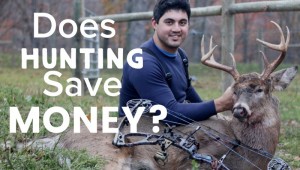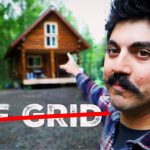This is a tricky question, with many answers, but I thought it would be fun to do a quick breakdown….
First let’s consider what harvesting a deer is worth in meat value.
When I harvest a deer and butcher it myself, a smaller deer yields around 40 lbs of free range, truly organic meat. A larger deer is double that.
When I butcher a deer, I generally break down the hind quarters and loin into steaks, and turn the rest into burger. One third of the deer becomes steak, and two thirds burger.
So what is the value of that venison? The best comparison would be to take the price of local, pasture raised meat, and compare the cuts.
At our local farmers market, basic pastured ground meat generally gets somewhere around $10 per pound. The better quality steaks fetch $15 per pound or higher.
So a smaller deer would be worth $525 in meat (relative to your local farmer’s market meat prices).
A bigger deer could be worth $1000!
That sounds amazing, right? $1000 dollars, just walking around the woods, ripe for the taking!
But before were finished with this breakdown, we need to consider the cost of hunting…
( I am afraid my wife will read this article and make me stop…. gulp)
A new hunter, with no gear already, has a big investment to make.
In this video, I share all the gear I take with me on every hunt. Not ALL of this gear is essential to get started, but I use most of it on every hunt.
When a hunter is brand new, they need to buy
- a weapon
- hunting clothing
- treestands or blinds
- gear – (flashlights, knives, rope, deer calls)
- first aid equipment
A new hunter can easily drop $1000 their first year in.
BUT…. you don’t have to. A new hunter could start with the bare minimum, a new Rifle and scope ($600). Get some warm clothes you already own, and head out…
My first season I spent about $600 into a bow and arrows, bought some cheap Walmart camo clothing and hit the woods.
So somewhere between $500 and $1000 will be spent in your first season. We have some good concrete numbers, but we still need to consider one thing…
Before we make our final calculation, let’s talk about the time investment.
This is another highly variable factor. Some people live in places with lots of deer, others are excited to see one deer all season.
If you are fortunate enough to live in a place with a lot of deer that still is no guarantee of success. A person’s skill comes into play too.
A new hunter is more likely to spook deer before ever having a chance to harvest one. It took me a whole season’s worth of botched encounters to finally get my first deer down.
But… When I finally did, everything changed…
My first season I invested around $600. I got zero deer. So not worth it.
BUT I learned a ton, and by season two, I had four deer in the freezer. Somewhere around $2500 worth of meat.
So the final calculation, does deer hunting save money?
$600 investment, $2500 worth of meat, That math checks out!
For the next few years I was able to put 4 deer in the freezer. More recently I have managed an average of 2 per season, although I have become much pickier in the deer I shoot.
Over those years I have purchased a lot more equipment, increasing my investment. More tree stands, a better bow, hunting blinds, gear….
So does Hunting deer actually save us money?
The answer is sometimes. Some seasons are better than others. This season I spent only $150 or so on hunting (ok, actually it was $300, I spent an additional $150 on an out of state hunting license, but that isn’t necessary for a hunter to do if they just hunt their home state) and I shot a big buck, after only 4 days of hunting!
$750 worth of meat, $150 spent, 4 hunts of about 3 hours each. That’s like getting paid $40 an hour to hunt. I can live with that!
(If you want to hear the buck hunting story, I share it in this video)
But not all seasons are that good. Last season I hunted more than I ever had, and I only harvested one small deer, probably less than 40 lbs of meat. So not so good.
At the end of the day Hunting has good potential to save you some money, if you’re smart with your purchases and time investment.
But one thing is for certain. Whether it saves me money or not, I enjoy a morning spent in the tree stand 100 times more than a morning spend in the office. If I can put some meat on the table, while doing something I enjoy, than that is worth every minute spent!
If you you would like to learn how to hunt take our Hunting Video Course, the Wild Harvest Whitetail 101 Course. ON SALE NOW!



I agree with you. Great calculation. For great hunting a hunter must calculate and save the money. Its necessary to increase and sustain the patient according to my personal Information.
You left some costs out. How much do you spend in gas and how much do you spend on licenses?
Yourcalculation doesn’t take into account the extra risks involved. Hunters get shot and fall out of tree stands every year.
Your point? Risks are involved with everything. You can get hit head on driving to the grocery store does that stop you. The article is about the cost of hunting not the risk.
Your right! The initial cost of gun, ammo and gear for the beginner can be a squeeze on the budget. However, once all the basic gear is purchased, the trick is to perfect your hunting game plan. The better you are at your game, the less extra spending is involved. My game plan is to know the area, know the game, and then patiently wait in ambush. I’ve never been successful stalking after big game. I’m good at tracking them, but I always jump them at too close a range only to watch them disappear. Overall, I love your article! Thanks!
Really I appreciate author, Great article bro. Actually I am not saving money. After I read your article I want to save my money. Your calculation very good bro
Nice post! I really appriciate your knowledge..
Organic is used very liberal. In Ag county deer are in fields that are freshly sprayed and also eat gmo crops. I raise cattle and I’m an avid deer hunter but make no mistake! Deer in farm land not even close to organic what so ever.
I’m just considering getting into hunting with a crossbow, so what if you can’t butcher the deer yourself? Do I need a special vehicle/equipment to haul the deer out of the woods. I’ll need to buy an extra freezer to store the meat. Obviously, the joy of hunting is a calculation that each person will have to make and perhaps that joy is worth the extra cost.
Bill, a deer can be field dressed and dragged out of the woods. But they do make little carts that make the job a lot easier. And yes, a chest freezer would be great, and will pay for itself over time!
Were in WI. We hunt on our land we farm about 200 acres. Our 3 boys (their teenagers)hunt from sept. until the end of Jan. (bow & gun). This yr. they were blessed with 6(so far this season). They will stop when they tag out(we usually get 13 tags). They also hunt small game. They enjoy it & we enjoy the meat 🙂
WOW! Your fam is doing great this year!
You left out the costs of processing. The average cost for processing is $125/deer, and it’ll be much more if you want special orders like jerky or sausages. Granted, you can do some (or all) of the processing at home and possibly save money to save money, but then you would need to purchase expensive equipment like grinders. It could take a few years before the investment would pay for itself.
Grinders don’t cost that much. My first year I bought a hand grinder for about $25. I now have an electric grinder for $130. It really does depend on your skill level, area, time available to hunt, how picky you are with your gear, and the variety of animals you harvest. I spend around $300 dollars a year for licenses and ammunition for myself and my son. That enables me to take every animal legal to hunt in NY where I live. This year I have 14 birds and 1 deer so far. That equates to roughly 90 pounds of meat. Averaging it to the low end at just $10.00 a pound that means I am up $600.00. Or would be since I was very busy when I got my deer I had it processed for me for $100.00. Still that puts me $500.00 ahead just this year. I have 6 tags left and late bird season yet to go.
This wasn’t a good assessment of the total costs associated with hunting. You mentioned a weapon, clothing, gear, stands, and first aid. You vaguely mentioned the cost of a license. You mentioned time investment but not the cost of time, like money lost from not going to work or doing something else of value. You didn’t mention anything about travel costs, costs of hunting on someone else’s private land, possible guide costs, cost of processing game (or equipment required to process yourself), ammunition cost, weapon safety class (required by most states to get a hunting license), range cost for practicing, weapon cases for transporting, etc.
All these cost added together, many of which are per-hunt cost, along with unknown success rates makes hunting far more expensive than simply picking up a protein like pork, chicken, turkey, hamburger on your normal grocery shopping day.
Many of those costs are also one time investments. Granted hunting can be a losing proposition monetarily depending on the individual and their expectations but it doesn’t have to be. The time you mentioned can be counted as a deficit but it can also be a benefit if you just love being in the woods. I am not a first time hunter at all but over the last 20 odd years I have gone from the red due to investments to consistently in the green. Usually I end up spending around $300 dollars between licensing and ammunition and shooting enough animals to at least double that in meat. Most hobbies don’t give a person a chance at a return on investment. You just spend money and get a good time.
This was a good analysis. Your point is well-taken; once you make the initial investment (like I have), and assuming you process your own harvest, the cost-benefit calculation is favorable compared to buying meat in the store in 2023. The more experienced you become, the less time you generally have to spend hunting as you learn to pattern the deer and place yourself in the right spots to get a shot – especially with doe and simply trying to fill your chest freezer. Harvesting a nice buck is a different proposition and does equate to more time and $$. Good article!